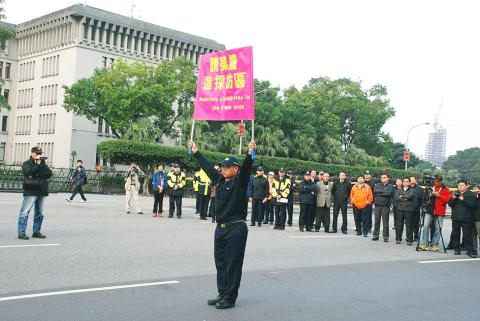Nearly 200 journalists have signed a petition against a decision by the Taipei City Police Department to designate press zones during demonstrations to “protect” reporters.
The police department announced on Thursday that it plans to designate a “petition zone” and a “press zone” during rallies, and that in cases of “illegal demonstrations,” it would ask reporters to stay in the press zone for their safety and to prevent them from getting in the way when police try to disperse the crowd.
Although the police department said it made the decision after discussing it with several media organizations — including the Association of Taiwan Journalists, the Taipei Documentary Filmmakers’ Union and the Taipei Foreign Correspondents’ Club — the announcement met with strong opposition from reporters, who accused the department of restricting press freedom.

Photo: Liu Ching-hou, Taipei Times
“This is a serious deprivation of the freedom of the press,” Lu Yi-jung (呂苡榕), a reporter with the Chinese-language magazine The Journalist, told the Taipei Times. “How the news is presented to readers, from which angle and where the reporter would like to stand on the scene should be decided by the reporter.”
“If reporters have to stay in a press zone designated by the police, why don’t we just file news stories according to the police press release and have the police provide us news photos?” Lu added.
Reporters serve as the link between a news event and the audience, and they strive not only to record what is happening, but also to take the audience to the news scene, Lu said.
“Recording what happened allows the public to make their own judgement on what to hate, what to love and how to think,” Lu said. “Restricting freedom of the press is no different from fooling the public.”
Hsu Chun-feng (許純鳳), a member of the production team of a Public Television Service news commentary show, agreed, saying that the decision is a repression of the freedom of the press.
“If reporters cannot walk around freely, how can they get a full picture of what is going on?” she asked.
“In my experience, most reporters would not interfere with police actions. We respect officers who are doing their job and they should give equal respect to reporters who are also at work,” she said.
At press time last night, 198 people — 90 percent of whom are journalists and including one police officer — had signed a petition against the police department’s decision.
Taipei Mayor Ko Wen-je (柯文哲) was not available for comment, but his assistant, Hung Chih-kun (洪智坤), said that the city government was shocked when it saw the news on Thursday night.
Hung added that the Ko administration did not initiate the policy.
The decision was made by Taipei Police Commissioner Huang Sheng-yung (黃昇勇), who is to retire in two weeks.
“Our core value is to protect the public right to petition and protest, as well as freedom of the press. We will not take the lead in undermining such values, Hung said. “We need more public discussions about the issue and to hear what the new police commissioner has to say about it.”

DAREDEVIL: Honnold said it had always been a dream of his to climb Taipei 101, while a Netflix producer said the skyscraper was ‘a real icon of this country’ US climber Alex Honnold yesterday took on Taiwan’s tallest building, becoming the first person to scale Taipei 101 without a rope, harness or safety net. Hundreds of spectators gathered at the base of the 101-story skyscraper to watch Honnold, 40, embark on his daredevil feat, which was also broadcast live on Netflix. Dressed in a red T-shirt and yellow custom-made climbing shoes, Honnold swiftly moved up the southeast face of the glass and steel building. At one point, he stepped onto a platform midway up to wave down at fans and onlookers who were taking photos. People watching from inside

MAKING WAVES: China’s maritime militia could become a nontraditional threat in war, clogging up shipping lanes to prevent US or Japanese intervention, a report said About 1,900 Chinese ships flying flags of convenience and fishing vessels that participated in China’s military exercises around Taiwan last month and in January last year have been listed for monitoring, Coast Guard Administration (CGA) Deputy Director-General Hsieh Ching-chin (謝慶欽) said yesterday. Following amendments to the Commercial Port Act (商港法) and the Law of Ships (船舶法) last month, the CGA can designate possible berthing areas or deny ports of call for vessels suspected of loitering around areas where undersea cables can be accessed, Oceans Affairs Council Minister Kuan Bi-ling (管碧玲) said. The list of suspected ships, originally 300, had risen to about

A Vietnamese migrant worker yesterday won NT$12 million (US$379,627) on a Lunar New Year scratch card in Kaohsiung as part of Taiwan Lottery Co’s (台灣彩券) “NT$12 Million Grand Fortune” (1200萬大吉利) game. The man was the first top-prize winner of the new game launched on Jan. 6 to mark the Lunar New Year. Three Vietnamese migrant workers visited a Taiwan Lottery shop on Xinyue Street in Kaohsiung’s Gangshan District (崗山), a store representative said. The player bought multiple tickets and, after winning nothing, held the final lottery ticket in one hand and rubbed the store’s statue of the Maitreya Buddha’s belly with the other,

Japan’s strategic alliance with the US would collapse if Tokyo were to turn away from a conflict in Taiwan, Japanese Prime Minister Sanae Takaichi said yesterday, but distanced herself from previous comments that suggested a possible military response in such an event. Takaichi expressed her latest views on a nationally broadcast TV program late on Monday, where an opposition party leader criticized her for igniting tensions with China with the earlier remarks. Ties between Japan and China have sunk to the worst level in years after Takaichi said in November that a hypothetical Chinese attack on Taiwan could bring about a Japanese